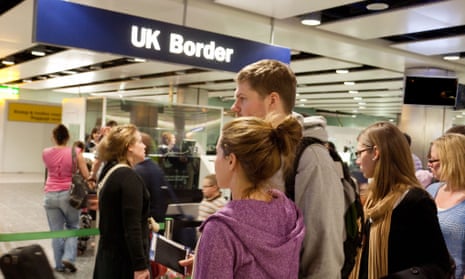EU citizens could have their lives turned upside down with bank accounts closed, employment terminated and rental agreements revoked if their current rights to reside in the UK are not guaranteed after Brexit, a leading immigration lawyer has warned.
Andrew Tingley, a partner specialising in immigration at London law firm Kingsley Napley, describes a “nightmare scenario” in which the government decides that those settled in the country before the referendum do not have the right to stay when the UK leaves the EU.
He says non-EU citizens seeking to secure the right of permanent residency in the UK are already subjected to what he says is a “deliberate hostility policy” by the Home Office, where life is made so difficult it becomes near impossible or impossible to stay in the country.
The government has declared it would like to offer the 3 million EU citizens settled in the UK before the referendum the right to remain but it has left the threat hanging in the air by declaring those rights “negotiating capital” in Brexit talks.
The Home Office has repeatedly said it cannot guarantee those rights unless the rights of the 1.2 million British people in the EU are reciprocated.
However, Tingley, who has been dealing with immigration cases for 20 years, says if Britain fails to get a deal for Britons in Europe it is highly unlikely that it will move to deport EU citizens in retaliation. Logistically, it would be impossible and politically, it would be explosive, he believes.
However, it could subject EU citizens to the Immigration Act 1971 and make it as difficult as possible for people to stay, he told a Guardian podcast.
He says the Home Office has deliberately operated a “hostile environment” policy for years in an effort to get non-EU immigration numbers down “because the Home Office doesn’t have the manpower to do what parliament has asked asked it to do”.
He says it has in effect outsourced immigration control to employers, landlords, banks and airlines, allowing them to seek proof of residency and create havoc for people if they do not have documents.
“In the nightmare scenario the day after Brexit, an employer who is on the ball, who holds a sponsor licence, will need to see their Europeans are here lawfully and they will ask the question: ‘Have you regularised your stay?’” he says. If not, they may have the right to terminate employment, he says.
“When it comes to renew your lease with your landlord and they say: ‘I want to see something that says something to say you can live here’, you lose your house. The DVLA takes away your driving licence, your bank closes your bank account down,” he said.
“We are dealing with this with non-EU nationals now and up to November, the Home Office outsourced immigration enforcement to a private company called Capita. So when we had clients who were refused, they got calls and text messages every hour asking them to leave the UK,” he said.
The podcast investigates the plight of EU citizens who intend to remain in the UK after Brexit, many of whom have been panicked into applying for a permanent residency (PR) card in order to document rights they already have through EU treaties.
Nicolas Hatton, the French founder of the3million, a grassroots group campaigning for EU rights, said the PR process was causing huge stress and anxiety among EU citizens.
The 85-page application form requires huge files of documentation including P60s for five years, historic utility bills and a diary of all occasions an individual has left the country since they settled in the UK.
Some have received letters inviting them to prepare to leave the country after failing to tick one of the boxes on the form.
Tingley says the language used in these letters is no accident. “It is designed to scare people,” he said. “It has not been written by a junior in the Home Office, it has been signed off by someone more senior.”
He said the “hostile environment” was a legacy of Theresa May as a home secretary who promised to get immigration numbers down.
“We have a prime minister who used to be the home secretary who wants to get the immigration numbers down. The government are using EU citizens as bargaining chips in the article 50 negotiations. They should not play into their hands and should do as much as they can to secure their position,” he said.
Britons living in Europe and EU citizens in the UK are due to give evidence to the House of Commons committee for exiting the European Union on Wednesday.
Hatton says he hopes the government will come up with “bespoke” arrangements for those already settled in the country.
Also giving evidence are Sue Wilson, a leader of the Bremain in Spain group, and Christopher Chantrey, the chairman of the British Community Committee of France.
